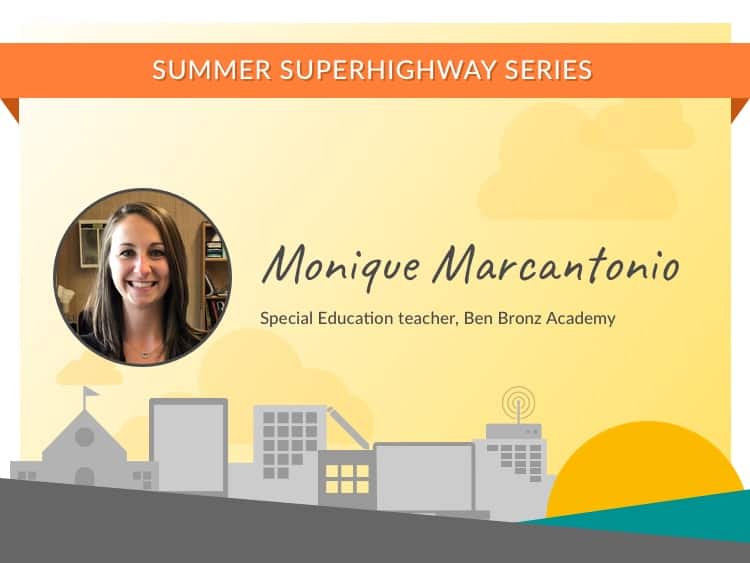Our Summer SuperHighway blog series celebrates the educators that inspire us and showcases the ways that digital learning impacts their students. For the second installment, we talked to Monique Marcantonio, special education teacher at Ben Bronz Academy, a school in Connecticut that empowers students with special needs to achieve academic success and strengthen their curiosity, perseverance, patience, self-reliance, motivation, and focus.
1. Do you think of your students as digital natives? Why or why not?
Yes. I feel like their generation was brought up around technology. I sometimes feel like they know more than us. Kids are growing up with technology when they’re born, they are all up-to-date on new technology and they even teach me new things.
2. What kinds of technology do your students use in the classrooms?
Every student has a laptop that they carry with them from class to class. They use the computer a lot, [especially] programs like Google Read and Write and Speech to Text, which reads the text for them and writes it. If they talk into the computer they can write a paper that way.
Some of our kids have visual impairments; Document Cameras help to enlarge documents so they can follow along with the rest of the class. We also use Google Classroom — it’s the platform that holds all their assignments.
Mini probes is an assessment for writing; I post it in Google Classroom and when the student is done, it submits it for me and sends me an email. I post links for science websites or YouTube videos into Google Classroom, and my students can just click and watch what I post in real time, which is pretty neat. I tend to project whatever I want and they can follow along on Google Classroom while I’m talking.
3. How comfortable are they using technology as a learning tool?
Eighty percent of my students are very comfortable [using technology]. Some students would rather handwrite things or have a hard copy of something. I just need to know that about my students. For instance, one student doesn’t like typing, so I have him hand write assignments. But another student loves the computer and excels at it. They get excited to use the computer versus if we were going to handwrite assignments. They are more fluent and comfortable with computers, especially in their free time when they choose to go on their computers and play games. It’s almost natural for them.
4. In what ways has technology helped support your role as a (special education) teacher?
One thing comes to mind in the first quarter of my first year as a teacher. I tried putting grades in a grade book and was never consistent with it because of how time-consuming and daunting it was, and I wasn’t able to keep organized. Fortunately, there’s this online grade book that a colleague introduced me too and now I don’t have to do any math; I can just plug in the students’ grades and it does the work for me. It’s way easier doing it that way and has helped me stay more organized and efficient.
Technology is useful for me every day. It supports me because it’s helping the kids. It’s making things easier for them, so it’s easier for me. I don’t have to print out as many things, they have what they need digitally (ie. Google classroom). It’s a time saver, makes my life easier, and makes me more efficient. I can do 10 things at once and multitask.
I also use Education.com for supplemental worksheets to help my students earn extra credit, or for when they have downtime in math class. I can type in the word ‘multiplication for 5th grade’ and boom: it pulls up multiplication worksheets for them, so instead of me having to come up with all these worksheets it’s all right there for me. Huge time saver.
5. In what ways could technology help in special education classrooms, that it doesn’t currently?
All technology should be able to be problem-solved by someone who is using it. If something goes wrong, I should know how to fix it.
In addition, technology doesn’t help them to be as independent [as I would like]. We need programs that are really simple to use and learn. One of my students gets very confused about what to do — there should be programs that are more simple to use. For example, Microsoft Word should be kid-friendly so they can use it independently; Microsoft is pretty advanced and I didn’t learn how to use that until high school, and my kids are using it in 5th grade.
Powerpoint and Excel are also confusing for my kids. Why can’t there be a more simplified, kid-friendly version of that too? I’d use those systems more often and they would help me and my students out so much if it was just easier to use.
6. In your experience, what is the relationship between Internet access at home/school?
Many of my kids have Internet access at home, but not every student is able to access the Internet and do their homework, so a lot of kids have to do their homework at school before they go home. Two out of 10 kids [in my class] don’t have Internet access at home. It’s the parent support that matters as well. Kids [who lack access at home] get their homework done at school to avoid that problem.
[In my experience,] special education teachers have more access to technology than general education teachers because technology has been built into my students Individualized Education Programs. However, my kids could benefit from more technology.
Sometimes, technology tends to be the easy way out because the programs will speak for you and sometimes the students can become lazy (“Speech to Text”), but some kids have very acute disabilities, where they need that technological support. As such, it’s about figuring out my students’ learning styles and what is actually helping or inhibiting them from advancing and making the transition from school to home seamless.
We look forward to sharing more from educators like Monique Marcantonio who are opening doors and increasing access to equitable education opportunities across the country. Stay tuned for our next installment of Summer SuperHighway.
Disclaimer: EducationSuperHighway is a non-partisan non-profit. We do not endorse any specific vendor, political entity, or organization. The views expressed in this series are exclusively those of the person or people being interviewed.




